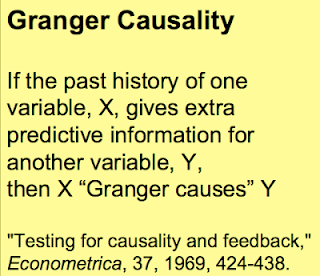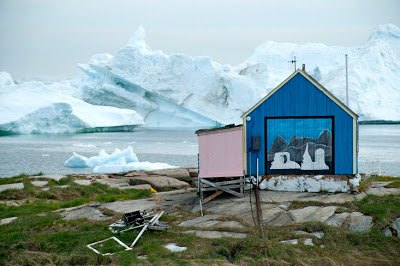Corroborazioni causali
Granger e la sua causalità prestata all'attribution climatica non si ferma.
Dopo uno dei primi tentativi (e le relative polemiche suscitate nelle solite contrade)
● A contribution to attribution of recent global warming by out-of-sample Granger causality analysis
(qui una sintesi in italiano)
❝In this article, we show that a genuine predictive approach of Granger analysis leads to overcome problems shown by these models and to obtain a clear signal of linear Granger causality from greenhouse gases (GHGs) to the global temperature of the second half of the 20th century. In contrast, Granger causality is not evident using time series of natural forcing.
e dopo un altro tentativo collaterale
● Exploring Granger causality between global average observed time series of carbon dioxide and temperature
❝This papers tests the hypothesis that Granger causality can be extracted from the bivariate series of globally averaged land surface temperature (GT) observations and observed CO2 in the atmosphere using a reverse cumulative Granger causality test (...). The results from this modified test show evidence for Granger causality from a proxy of total radiative forcing (RC), which in this case is a transformation of atmospheric CO2, to GT.
dopo un secondo da parte degli stessi autori del primo
● Evidence of recent causal decoupling between solar radiation and global temperature
❝Here, by means of an inferential method—the Granger causality analysis—we analyze this situation and, for the first time, show that an evident causal decoupling between total solar irradiance and global temperature has appeared since the 1960s.
ecco un recente update con risultati ancora più robusti.
● Anthropogenic global warming hypothesis: testing its robustness by Granger causality analysis
❝In research into the main causes of recent global warming, the Granger causal link from anthropogenic forcings to global temperature has often been analyzed in a bivariate system, with an evidence of a causal effect of greenhouse gases on temperature as the final result. In the present paper, the robustness of these results are investigated by considering an auxiliary variable in the system. In particular, we include natural forcings and some patterns of natural variability, separately, as the third variable. Previous bivariate Granger results are shown to be robust.
Conferme su conferme, si direbbe.
Ma voglio essere il meno ottimista / pessimista possibile e invece il più possibilista: potremmo definirlo un ennesimo tentativo fallito di confutazione di quello che rimane tutt'oggi provvisoriamente non falso.




Commenti
Posta un commento